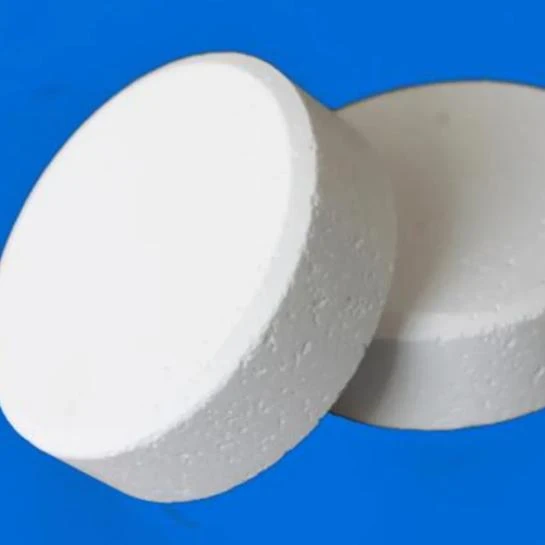
tcca trichloroisocyanuric acid
Trichloroisocyanuric Acid An Overview of TCCA
Trichloroisocyanuric acid (TCCA) is a chemical compound widely used in various applications, particularly in water treatment and disinfection. This organic chlorine compound is a chlorinated isocyanuric acid derivative, which is particularly valued for its strong disinfecting and oxidizing properties. In this article, we will explore what TCCA is, how it works, its applications, and safety considerations associated with its use.
Chemical Composition and Properties
TCCA has the molecular formula C3Cl3N3O3 and is often found in solid form as white, free-flowing granules or tablets. The structure of TCCA includes three chlorine atoms, one isocyanuric acid moiety, and one nitrogens, giving it a high chlorine content of about 90%. This high chlorine content contributes to TCCA's effectiveness as a disinfectant, making it a preferred choice for various sanitation processes.
TCCA is relatively stable, especially when stored properly away from moisture and high temperatures. However, it can release chlorine gas if it comes into contact with acids or is heated excessively. Therefore, proper handling and storage protocols are essential to ensure safety and maintain its efficacy.
Applications of TCCA
1. Water Treatment One of the primary applications of TCCA is in the treatment of drinking water and swimming pool water. It acts as a source of chlorine, which is essential for killing harmful microorganisms such as bacteria, viruses, and algae. By using TCCA, water treatment facilities can ensure that the water supplied is safe for consumption and recreational use.
2. Disinfection TCCA is widely used in hospitals, food processing plants, and other industrial settings where disinfecting surfaces and equipment is critical. Its ability to rapidly kill pathogens makes it an effective solution for maintaining hygiene in environments that require strict sanitation practices.
tcca trichloroisocyanuric acid

3. Agricultural Applications In agriculture, TCCA serves as a disinfectant for livestock and poultry environments, helping prevent disease outbreaks in farms. Additionally, it could be used in irrigation systems and for treating water used in agricultural processes.
4. Swimming Pools and Spas TCCA is frequently utilized in the maintenance of swimming pools and spas. It provides a controlled release of chlorine, which helps in maintaining a consistent level of disinfection. Pool operators appreciate its effectiveness and ease of use, as it is available in tablet form, allowing for convenient application.
Safety Considerations
While TCCA is a potent disinfectant, it is essential to handle it with care. Exposure to TCCA can irritate the skin, eyes, and respiratory system. Therefore, appropriate personal protective equipment (PPE), such as gloves and goggles, should be worn when handling this chemical. Additionally, breathing in dust from TCCA can be harmful, and it is advisable to use it in well-ventilated areas.
Furthermore, TCCA should not be mixed with other chemicals, particularly acids or ammonia, to avoid dangerous reactions. Proper storage practices include keeping TCCA in a cool, dry place, away from incompatible materials.
Conclusion
Trichloroisocyanuric acid stands out as a highly effective and versatile chemical widely used in water treatment, disinfection, and agricultural applications. Its strong oxidizing properties and stability make it an invaluable tool for ensuring sanitation and safety in various environments. However, responsible usage and adherence to safety guidelines are crucial to harnessing its benefits while minimizing potential risks. As we continue to seek effective solutions for sanitation and hygiene, TCCA remains a key player in the realm of water treatment and disinfection technologies.
-
Pure Sodium Dichloroisocyanurate Dihydrate | Powerful DisinfectantNewsAug.29,2025
-
Industrial Chemicals: Quality & Purity for Every IndustryNewsAug.28,2025
-
Nitrile Rubber Honoring Strict Production StandardsNewsAug.22,2025
-
Aspartame Ingredients Honoring Food Safety ValuesNewsAug.22,2025
-
Fertilizer for Balanced Plant NutritionNewsAug.22,2025
-
Cyanide Gold Processing with High Purity AdditivesNewsAug.22,2025
-
Formic Acid in Textile Dyeing ApplicationsNewsAug.22,2025
Hebei Tenger Chemical Technology Co., Ltd. focuses on the chemical industry and is committed to the export service of chemical raw materials.
-

view more DiethanolisopropanolamineIn the ever-growing field of chemical solutions, diethanolisopropanolamine (DEIPA) stands out as a versatile and important compound. Due to its unique chemical structure and properties, DEIPA is of interest to various industries including construction, personal care, and agriculture. -

view more TriisopropanolamineTriisopropanolamine (TIPA) alkanol amine substance, is a kind of alcohol amine compound with amino and alcohol hydroxyl, and because of its molecules contains both amino and hydroxyl. -

view more Tetramethyl Thiuram DisulfideTetramethyl thiuram disulfide, also known as TMTD, is a white to light-yellow powder with a distinct sulfur-like odor. It is soluble in organic solvents such as benzene, acetone, and ethyl acetate, making it highly versatile for use in different formulations. TMTD is known for its excellent vulcanization acceleration properties, which makes it a key ingredient in the production of rubber products. Additionally, it acts as an effective fungicide and bactericide, making it valuable in agricultural applications. Its high purity and stability ensure consistent performance, making it a preferred choice for manufacturers across various industries.





